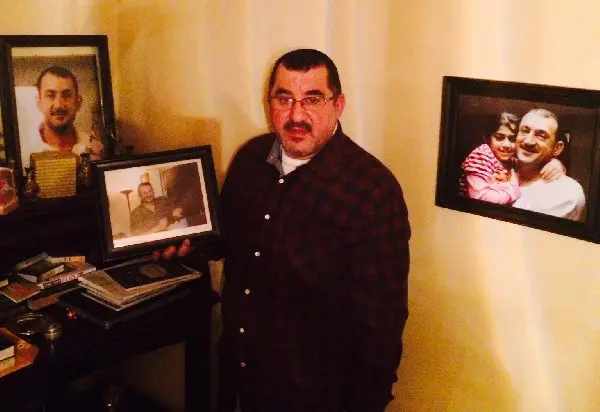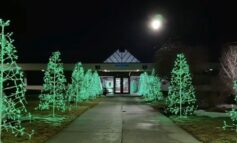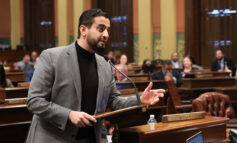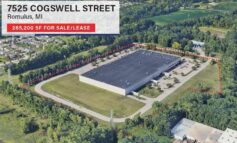
|
| Imad Kobeissi holding up one of the six photos he has framed in the living room of his Dearborn home of his brother Adel Kobeissi, who was shot and killed by a gunman April 1, 2010 at his Detroit gas station. |
DETROIT – There are six framed photos of Adel Kobeissi, a Lebanese American, who was murdered at his Detroit gas station nearly four years ago, inside the living room of his brother’s Dearborn home.
“I carry pictures of my brother everywhere, in my car, in my phone, and at work to remember him. Especially now, it will be four years in 20 days,” Imad Kobeissi said.
His brother was gunned down at the station April 1, 2010, one day before he was planning on taking his wife and children on a family vacation to Florida.
A gunman robbed and shot him in the head after he closed the station.
Kobeissi says the gunman thought his brother was carrying a lot of money, but all he got away with was change. “He killed my brother for change,” he said.
Despite offering an $18,000 reward to anyone who could help police find the gunman, the case still isn’t solved.
“Until today we still try and get an answer from police, and they tell us they have lots of cases,” Kobeissi said.
Over the decades an overwhelming number of Chaldeans and Arabs have been killed at small family businesses, while working to make a living and support their families. Many Middle Eastern Americans in Southeast Michigan can relate to the Kobeissi family’s heartache and loss.
In 2012 the Chaldean American Chamber of Commerce told Crain’s Detroit Business it could name more than 200 local store owners in the close-knit community, who were killed in businesses throughout Detroit and its surrounding suburbs since the 1970s.
For years the Chaldean Federation of America kept a booklet, entitled, “Commemoration of Chaldeans Slain in Their Place of Business” that featured the photos of murdered store owners, in addition to details of the crimes.
There is no figure available for the number of Arab Americans, who have been murdered at family businesses, but the number is also very high.
“We don’t have an exact number, but we are aware of many from our community who have been killed,” said Fay Beydoun, the executive director of the American Arab Chamber of Commerce.
Many Arabs and Chaldeans who migrated to the United States escaping political turmoil in their homelands, have been subjected to violent crimes at their businesses while trying to start new lives.
Southeast Michigan has the highest concentration of Arabs and Chaldeans in the entire country. Members of both communities are known for their tough work ethic, and have contributed immensely to the region’s economy through their entrepreneurial spirit. According to a report, 75 of the 84 supermarkets in Detroit are owned by Chaldeans.
Many Middle Eastern Americans purchased and worked in supermarkets, gas stations, convenient stores, dollar stores, hotels, among other types of businesses to make a living after arriving to the country.
“What else can I do? If there was something else I would. But most of us we don’t have another option,” Kobeissi who works at a market in Detroit said.
The most recent deaths involve two Chaldeans, a Farmington Hills convenient store owner named Duraid Lossia, who was murdered in December, and a Troy gas station clerk named, Athir Putres who was found dead of a gunshot wound to the head in February.
“Every time there is a funeral we always say we’re going to do something to stop the killing of business owners, but we never do,” said Hassan Bazzi, a Dearborn Heights resident, who distributes supplies to gas station owners, and is a representative of Tri-Lakes Petroleum.
In 2012, the death of Fred Dally, who owned a liquor store in Detroit, and was the former chairman of the Associated Food and Petroleum Dealers Board of Directors, shocked the Chaldean community.
Dally’s death pushed Omar Binno, a case manager at the Chaldean Community Foundation to produce the YouTube video, The Living Years-A Chaldean Tribute.
The video has garnered thousands of views, and is dedicated to all the Chaldean store owners and their families who lost their lives, and suffered tragic loses due to violent crime. The video features the family members of people who were killed in stores over the years.
Binno was only three-years-old when his father was killed in 1974, at a store in Detroit, and one of his second cousins was murdered in 1989 at a family business.
Binno told The Arab American News (TAAN) he plans on raising more awareness on the issue soon. “I think it is something that you learn to live with, but at the same time a part of you dies,” he said.
Binno described the crimes against business owners as horrendous and tragic. In the video he says, “…When something that terrible happens, a part of you dies with that person and I think a part of you will always, be sad over it, nothing can completely heal that, but I think faith teaches us to move on with the knowledge that we will one day be reunited with these people,” Binno said.
Slow police response times in Detroit have made the business environment in the city even more dangerous.
In 2012 TAAN interviewed a Detroit gas station owner who was held up two weeks earlier by a gunman with an AK-47, and said police never showed up.
Many Detroit store owners have been encouraged to hire security guards at their businesses to help prevent crime. “The business owners in the city of Detroit have stuck it through, and supported the city, and now it is time for the city of Detroit to step up,” said Beydoun.
Beydoun and Auday Arabo, the president of the Associated Food and Petroleum Dealers, have worked hard raising awareness to law enforcement officials about the dangers business owners face daily.
Beydoun says providing Detroit businesses with adequate security is crucial to the city’s economic development.
The increase in crime has pushed many Arabs and Chaldeans to consider selling their businesses.
Bazzi says he knows a lot of people who are looking for jobs, but turn down the ones they are offered in Detroit, because of the dangers associated with working in the city.
He also noted many business owners are trying to leave Detroit, but can’t because no one is willing to invest in the city’s small businesses.
“Many of them asked me to find a buyer for them, but at this point no one is interested in investing. They are stuck, they jeopardize their lives 24/7,” Bazzi said.
He says many gas station owners deal with stealing, and customers coming in drunk or on drugs daily. “If they run into a problem, and call 911 in Detroit, that doesn’t do them any good,” Bazzi said.
Nabby Yono, Vice President of Community Relations at the Arab American and Chaldean Council says the violence plaguing store owners can have psychological effects.
He says people who have witnessed crime take place in businesses tend to be paranoid when they return to work.
“You’re on edge all the time, you snap. You don’t feel it when it happens, but afterwards, and later on as you think about it, it has a psychological impact. You might think somebody is always out to get you, or somebody walks behind you, and you get very paranoid. It could have a devastating impact,” Yono said, adding that some people are too scared to visit the city because of their own personal experiences.
Yono is a former liquor store and supermarket owner. He came to the United States in 1968, and in 1969 his cousin Albert Yono was murdered in a Detroit store.
“As a young man I was devastated because he was my age, facing violence and murder in the city,” Yono said.
In 1972 one of Yono’s businesses were robbed, and he was held up at gunpoint.
His security guard was killed in the robbery. Yono says the security guard had a family, and also worked at Chrysler to make extra money.
“It left a scar, definitely, even though he was not a blood relative,” he said.
Yono says even when he doesn’t personally know a store owner who gets killed he attends funeral services for them to offer sympathy to the family, and support members of his community.
The next generation of Arab and Chaldean Americans seem to be pursing different career paths, and are going into professional fields such as medicine, law and politics.
“The next generation will be a lot different than us,” Yono said.






Leave a Reply